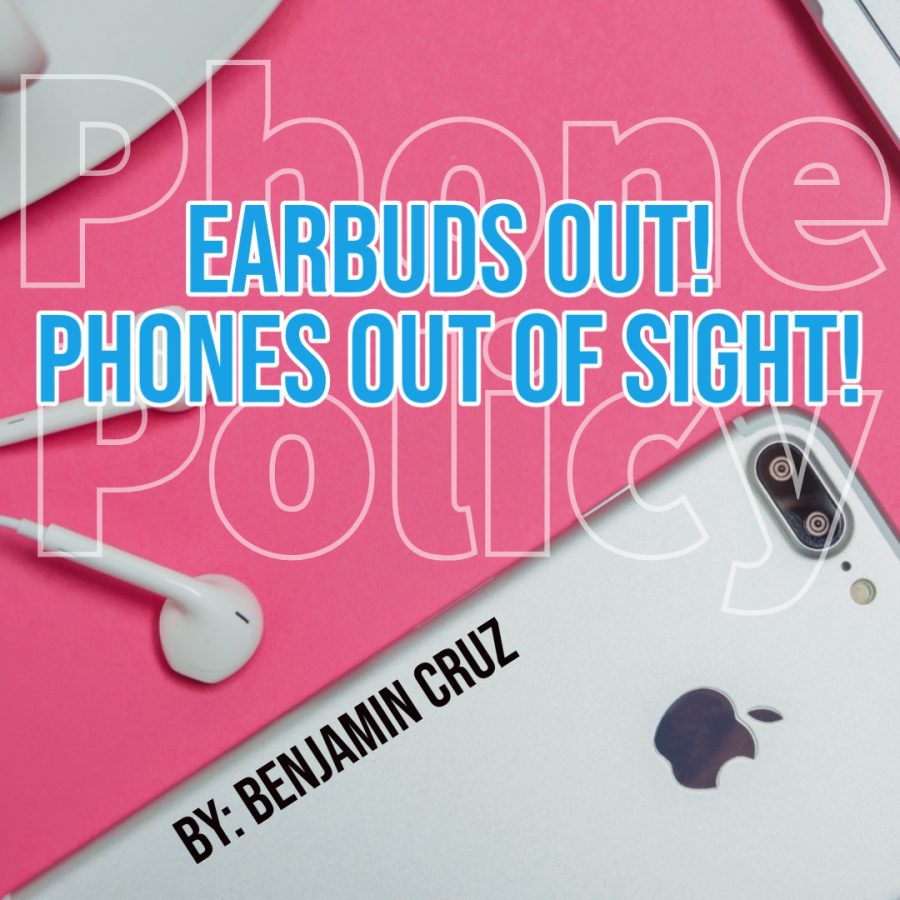Earbuds out! Phones out of sight!
Teacher and student thoughts about the new phone policy
October 25, 2022
The era of phones being tolerated during class time has come to a close with the introduction of the new Virginia Beach City Public Schools cell phone policy which bans them from being used during instructional time.
The regulation specifically states that, “students are prohibited from using personal communication devices during instructional time or in instructional settings. Leaving the classroom during instructional time to use personal communication devices in another setting may constitute a violation of the Code of Student Conduct. Personal communication devices should not be used in bathrooms.”
This change has caused quite a stir with both students and teachers on both sides of the controversy..
“No, I do not like the new phone policy,” said senior Jace Thrasher. “Apart from making school boring, it’s giving people more reasons to get in trouble that it feels unnecessary.”
On the other hand, junior Fox Muncy “doesn’t mind the new policy,” but notes that “it makes things more inconvenient.”
“When doing classwork sometimes you need to take a photo of notes or instructions, without the phone it can be hard to do so,” said Muncy
Students aren’t the only people impacted by this policy. Teachers and staff have been as well.
“From the teaching perspective, phones are a huge distraction for students,” said Social Studies teacher Mary Stevenson. “The best students sometimes don’t realize how much it distracts them from getting all they can out of a class. Listening to music during class time can take away a lot of opportunities for students to learn. They miss out on instructions, class discussions, and thinking time where they allow their brains to clearly think about what needs to get done.”
Stevenson added that “teachers want to be able to reach their students and help them, but if they are distracted by texts, apps, and music they miss that time with their teacher and classmates.
“Teachers don’t want to be the bad guy, we just care about our students and want them to be successful in school,” said Stevenson.
Consequences are also necessary to enforce this new policy. When a person does something they are not allowed to do, they receive consequences.
The consequences are as follows:
1st – Verbal Warning
2nd – Verbal Warning & parent contact
3rd- Teacher Detention
4th and beyond – referral to administrator
Some students feel the repercussions are not severe enough for them to go out of their way to keep their phones out of sight.
“Whether or not teachers or students like to admit it, students are still using their phones,” said Muncy. “The punishment doesn’t make having your phone out even feel risky.”
Regardless of the severity of the consequences, teachers have noticed that the policy has made a difference during instructional time.
“Students who are tuned in to class, perform better on their tests, have plenty of class time to get their work done without giving themselves homework or just falling behind, and we have a better time in class in general,” said Stevenson. “We have time to laugh together and work together. I can get to know a student better when they engage in class. Then I’m able to help them where they actually need help, shape my lessons around what works for them, and it makes teaching more enjoyable.”
The new cell phone policy may be a hard pill to swallow, but it is possible to see it as an effective way to increase productivity in the classroom and reduce distractions.


AreJay • Oct 25, 2022 at 11:47 am
I believe students who have phone issues are not going to let a policy stop them; therefore, only harming people who uses their phones responsibly. Great article, very skillful in writing.